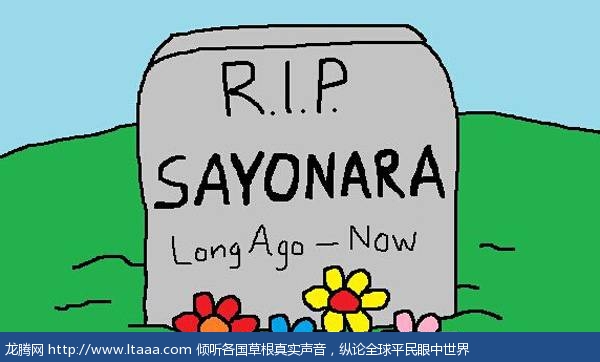70%的日本人在再见的时候不说“sayonara“ [日本媒体]
东京--如果你要一个从来没有学过日语的人说几个他们知道的日语词汇,很有可能他们会想起"sushi寿司","samurai武士",”ninjia忍者“,”konichiwa你好“,当然,还有sayonara--再见。日本网友:太搞笑了,“才调查了30个人”,这并不是统计学意义上的一个足够大的样本。更不用说大阪和东京附近的人有着不同的说话习惯了。
TOKYO — If you were to ask people who have never studied Japanese before to name some Japanese words they know, chances are there’s a few that would come up again and again: sushi, samurai, ninja, konnichiwa, and of course, sayonara – “goodbye.”
东京--如果你要一个从来没有学过日语的人说几个他们知道的日语词汇,很有可能他们会想起"sushi寿司","samurai武士",”ninjia忍者“,”konichiwa你好“,当然,还有sayonara--再见。
But according to a recent survey conducted by Japan’s livedoor News, the average Japanese person doesn’t use the word “sayonara” at all. They asked 30 people of a variety of ages and genders if they used the word, and the results don’t look good for the “goodbye” word.
不过根据日本的livedoor news最近的一项调查,大多数日本人不再使用sayonara这个词了。他们向不同年龄和不同性别的30个人问这个问题,然而说soyonara的人甚至还没有说goodbye的人多。
Twenty-one of the 30 people — 70% — said they “don’t use it” or “don’t use it all.” And when narrowed down to the younger crowd, 20- to 30-year-olds only, 11 out of 14, or 80%, said the same. The sampling size may not be the largest, admittedly, but chances are similar percentages would carry over into the population at large.
这30人中有21人--70%--表示“他们不用这个词”或者“根本就不用这个词”。不过当把调查范围缩小到20-30岁之间的人群时,14个人中有11个人--80%的人也这么说。样本的数量可能不大,不过很有可能在大规模的人群中比例也差不多。
Here are some reasons for why people seem to be saying “goodbye” to sayonara:
以下是一些为什么人们更倾向于说goodbye而不是sayonara的原因
“I don’t like ‘sayonara’ because it makes our meeting feel like the end.”
“我不喜欢说sayonara”因为它听起来像是一次见面的结束。“
“Saying ‘sayonara’ makes it seem like we won’t meet again, so I don’t use it. It feels like a cold word.”
“说sayonara听起来像是我们再也不会见面了,所以我不用它,感觉这是个很冷酷无情的词”
“At work or with family and friends, I always just say ‘see you later’ instead.”
“在工作中或者家人和朋友中,我一般说待会见而不是sayonara”
“Sayonara” definitely has an air of finality to it. Just like most English speakers don’t say “farewell” unless it’s truly the end, most Japanese people would feel a little strange saying “sayonara” if they were just going to see the same person again tomorrow.
sayonara绝对是含有结束的意味,就像说英语的人不说"farewell",除非真的结束了。大多数日本人会感到有点不自在如果他们对一个明天依旧会见面的人说sayonara的话。
But then that brings up another question: if you’re not going to say goodbye to someone with “sayonara,” what do you say instead?
不过这就引发了一个问题:如果你不说sayonara的话,你说什么呢?
Luckily, Japanese is a veritable buffet when it comes to different ways of saying hello, goodbye, and everything in between. Here are just a few samples of all the different tasty expressions you can use to part ways with someone without sounding like a samurai departing for some distant land:
幸运地是,在日语有很多种表达你好,再见这种意思的说法。以下是当你和某人暂时分开时可以说得一些比较恰当的,听起来不像是一个武士准备离开故土前往远方时说得话的例子:
Ja ne. (See ya)
(待会见)
Mata ne/kondo/ashita/raishuu. (See you later/next time/tomorrow/next week)
Mata ne/kondo/ashita/raishuu(待会/下次/明天/下周见)
Shitsurei shimasu. (I’m sorry for having been rude – on ending a phone call, leaving work, etc.)
Shitsurei shimasu(不好意思失礼了--打电话结束或者下班的时候说的)
Osaki ni shitsurei shimasu. (I’m sorry for rudely leaving before you [at work])
Osaki ni shitsurei shimasu(很抱歉先走了【工作中用的】)
Otsukaresama desu. (You must be tired, thank you for your work.)
Otsukaresama desu(你肯定很累了,谢谢你的工作)
Gokigenyou. (Fare thee well – if you want to sound fancy)
Gokigenyou(再会-如果你想说点华丽的辞藻的话)
Bai bai. (If you want to sound cute)
baibai(如果你想说的萌一点的话)
So the next time you’re out with Japanese-speaking people, what will you do? Will you help resuscitate the dying “sayonara?” Or will you let it die its linguistic death and enjoy the rainbow of other “goodbye” flavors? Make your choice soon, before it’s too late to say “farewell!”
那么你跟一个说日语的人在一起的话你会说什么呢?你会说sayonara还是会用“再见”的其他表达方式呢
Futaro Gamagori
kids say "sayonara" at school everyday
然而,小孩们在学校每天都说sayonara
roosterman77
30 people surveyed? I hear and use the phrase everyday as well as others... from young and old. I don't think it has an air of finality to it. What were the actual questions asked? No offence to the surveyor but the responses sound made up... I think the phrase is warm and sincere.. unless different areas of Japan have different views on the phrase. Perhaps my area is more traditional.
才调查了30个人,我每天都使用或听到老人小孩们这个词,别人也是一样. 我不认为人们都不用这个词了。调查都时候到底问了些什么呢?我不是有意冒犯做调查的人,只是这些回答听起来像是编造出来的...我倒觉得这个词很温和并且真诚...除非日本不同地方的人对这个词有不同的理解方式。也有可能我的观点太陈腐了。
Robert Dykes
"They asked 30 people of a variety of ages and genders" LOL Not a statistically large enough sample size. Not to mention people as close as Osaka and Tokyo have totally different language use characteristics.
太搞笑了,“才调查了30个人”,这并不是统计学意义上的一个足够大的样本。更不用说大阪和东京附近的人有着不同的说话习惯了。
版权声明
我们致力于传递世界各地老百姓最真实、最直接、最详尽的对中国的看法
【版权与免责声明】如发现内容存在版权问题,烦请提供相关信息发邮件,
我们将及时沟通与处理。本站内容除非来源注明五毛网,否则均为网友转载,涉及言论、版权与本站无关。
本文仅代表作者观点,不代表本站立场。
本文来自网络,如有侵权及时联系本网站。
图文文章RECOMMEND
热门文章HOT NEWS
-
1
最近,新冠肺炎疫情在日本有扩大的趋势,有专家呼吁日本应当举国行动起来,共...
- 2
- 3
- 4
- 5
- 6
- 7
- 8
- 9
- 10
推荐文章HOT NEWS
-
1
最近,新冠肺炎疫情在日本有扩大的趋势,有专家呼吁日本应当举国行动起来,共...
- 2
- 3
- 4
- 5
- 6
- 7
- 8
- 9
- 10











